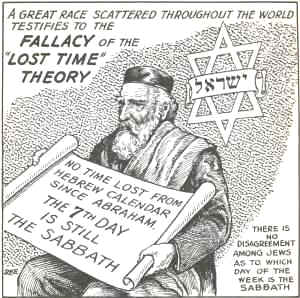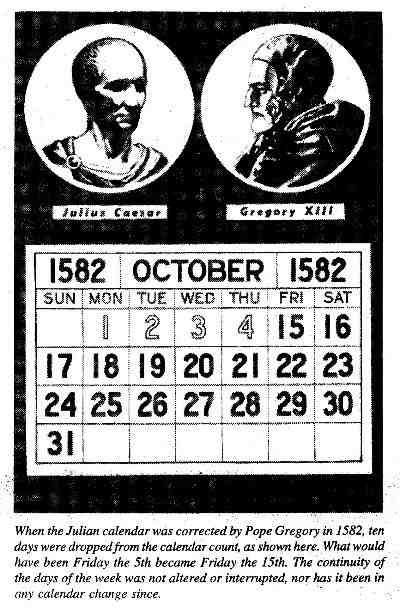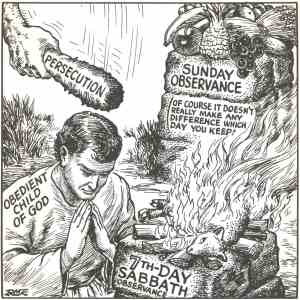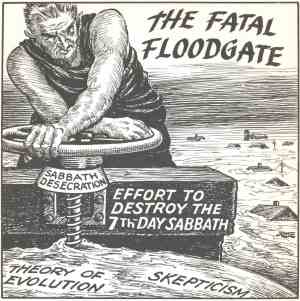"Come now, and let us reason together, saith the LORD: . . . If ye be willing and obedient, ye shall eat the good of the land:" Isaiah 1:18,19
Lesson #17
YOUR QUESTIONS ANSWERED
In the prophecies of Isaiah, we see the prophet answering questions for those who are puzzled. "Watchman, what of the night? Watchman, what of the night?" is the anxious inquiry. To this Isaiah replies, "The morning cometh, and also the night: if ye will inquire, inquire ye: return, come" (Isaiah 21: 12).
Isaiah did not discourage honest questions. "If ye will inquire, inquire ye," he said. Any "watchman" who has been set to guard the spiritual interests of the people should welcome sincere questions.
(When the rich young ruler came to Jesus asking about the way of life, Christ answered him without hesitation. But insincere quibblers Jesus silenced with His penetrating questions and answers (Matthew 22:23-33, 41-46).
In this lesson, we want to answer questions that are often raised about the Sabbath-Sunday issue. These matters are of great importance to us; for the midnight of sin is coming upon the world, and the law here is our first question, a very important one:

1 - HAS THE SABBATH BEEN LOST DOWN THROUGH THE AGES?
Some have asked, "Has time been lost?" "Has the Sabbath been lost?" We reply No. The Sabbath has never been lost, If the Sabbath had been lost between creation (that is, Adam's time) and Moses' day when God gave the written law with the Sabbath as the fourth commandment, this loss of time would have been rectified. Note the following:
(Forty years, or 2,080 weeks. God worked a number of miracles every week, thereby pointing out the identical seventh day 2,080 times (Exodus 16). In the wilderness before the children of Israel reached Mount Sinai, the manna (food from heaven) fell on each of the first five days of the week. That was one miracle. Any portion kept over one day would spoil. Then on the sixth day a double portion fell. This was another miracle. The unused portion kept over to the seventh day did not spoil. This was a third miracle. To this we might add the fact that on the seventh, or Sabbath, day no manna fell. And this could be called a fourth miracle. God thus emphasized the sacredness of the Sabbath and clearly marked the seventh day.
If the Sabbath had been lost between Moses' time and Jesus' day, the Saviour would not have made it His custom to observe the Sabbath (Luke 4: 16). But we have the example of the Saviour, which is indeed sufficient. "He that saith he abideth in Him ought himself also so to walk, even as He walked" (1 John 2:6).
Has the Sabbath been lost since Jesus' day? And what about the calendar? The calendar has been changed, but there has been no loss of time or change in the rotation of the days of the week.
The Julian calendar was in use when Jesus was on the earth. Its originator, Julius Caesar, died about 40 years before Christ was born. The week in use in the East at that time was precisely the same as the week of our calendar today, which is the Gregorian. The days of the month are different, but the days of the week were never changed.
 The change from the Julian to the Gregorian calendar occurred in this
way: The Julian calendar used for sixteen centuries was not accurate in
the length of its year, being about eleven minutes too long. By A.D. 1582, the
vernal equinox of March 21 had receded to March 11 and was ten days off
schedule.
The change from the Julian to the Gregorian calendar occurred in this
way: The Julian calendar used for sixteen centuries was not accurate in
the length of its year, being about eleven minutes too long. By A.D. 1582, the
vernal equinox of March 21 had receded to March 11 and was ten days off
schedule.
Scientists in the time of Gregory XIII led out in the change, and the Gregorian calendar began to function at Rome on Friday, the 5th of ( October, 1582. Friday the 5th was changed to Friday the 15th. The week remained untouched, and the days of the week were undisturbed.
Some nations began the use of the new calendar at once. Others began later. England waited 170 years, until 1752. Yet-all that time-these different states and nations with different calendars had the same week!
Just remember that the seventh day of the week today is the same as when Christ was here, and the calendar changes have not affected it. The Jews, scattered over the earth, have kept strict account of time; and wherever you find the orthodox Jew you find the seventh-day Sabbath. God has protected the Jewish people over the centuries, so they could testify as to which day of our week is the true Sabbath-the Bible Sabbath, the only Sabbath ever given to mankind by the God of heaven. So it is clear that the Sabbath has not been lost in our calendar.
 2 -
DID THE RESURRECTED CHRIST ALWAYS APPEAR ON THE FIRST
DAY?
2 -
DID THE RESURRECTED CHRIST ALWAYS APPEAR ON THE FIRST
DAY?
The answer is No. The record of Scripture does not support such a view. As a matter of fact, there are only three such meetings where the time is indicated.
1. The resurrection day (which was, of course, Sunday, in John 20: 19), when Jesus met with His disciples who were "assembling for fear of the Jews."
2. A meeting "after eight days," when the doubting Thomas met Christ (John 20:26).
3. The day of the ascension, which occurred "forty days" after the resurrection (Acts 1:3, 9). A glance at the calendar will quickly reveal to you that if the resurrection was on Sunday, the ascension, which was forty days later, could not possibly have occurred on Sunday.
It is interesting to note that those who claim that, after the resurrection, Christ always met with His disciples on Sunday do not cite John 21: 16 as an example. If this meeting was on a Sunday, then evidently the disciples considered fishing a proper occupation for that day. Nor did Jesus reprove them. Instead, He instructed them how to catch fish, and He cooked fish for them.
Christ appeared to His disciples at other times, but we are not told the day of the week. The time of Christ's appearance to His disciples has no bearing on the question of a weekly day of worship. The identity of God's holy day does not rest on such irregularities as meetings. A specific command points it out (Exodus 20:8-11). How much we need to study our Bibles in order to know what God would have us do!
 3 -
IS NOT ONE DAY JUST AS HOLY AS ANOTHER?
3 -
IS NOT ONE DAY JUST AS HOLY AS ANOTHER?
Christ Himself made the Sabbath at creation and repeated the Sabbath command from Sinai. And He never made any other day holy (John 1:1-3, 14; Mark 2:27-28).
We should remember that no one man or even all men together can make a single day holy. Only God can make a day holy. Only God can make men holy. It is God's special presence that makes any place or day or thing holy (Exodus 3:1-5).
The following Bible text is often quoted to support the claim that each man may choose his own day of worship:
Romans 14:5-6-"One man esteemeth one day above another: another esteemeth every day alike. Let every man be fully persuaded in his own mind. He that regardeth the day, regardeth it unto the Lord; and he that regardeth not the day, to the Lord he doth not regard it."
Paul had no authority to create new holy days. In the text quoted, Paul was speaking of yearly ceremonial days. He was seeking to divorce the Jewish Christian from continuing to regard with holiness the feast days of the ceremonial system (Leviticus 23:1-2, 4-37, 39-44). Note that verse 3 and verse 38 indicate that the weekly Sabbath is distinct from the ceremonial, or yearly, sabbaths.) He also sought to lead them not to judge one another on the matter of observing these ceremonial laws.
The "every day" of Romans 14:5-6 sometimes means the "six working days" (Exodus 16:4). Let us remember also that Christ is the one who esteems the seventh day above the other weekly days. He places His special blessing on it. If you invite me to a dinner at your home on Saturday and I come on Sunday, I simply miss the occasion. If a man has seven sons, he cannot make the firstborn the lastborn-and no one else can. Neither can any mere human transfer the sacredness that God placed on the seventh day to the first day.
Let us keep in mind five facts: (1) On the seventh day God rested. (2) The seventh day is the only weekly day to which God gave a sacred name. (3) It is the only one He blessed. (4) It is the only one He hallowed. (5) It is the only one He has commanded us to keep (Genesis 2:1-3; Exodus 20:8-11).
You need not fear that you will sin by not keeping Sunday for there is no Biblical law demanding Sunday observance. There is no instruction whatever about keeping it. According to Exodus 20:9, the first day is just another working day.
 4 - WAS THE SEVENTH-DAY SABBATH NAILED TO THE CROSS?
4 - WAS THE SEVENTH-DAY SABBATH NAILED TO THE CROSS?
The apostle Paul would answer, "God forbid!" But Paul does make it clear that the Jewish ceremonial sabbaths were nailed to the cross. Here are his words:
Colossians 2:14-17- "Blotting out the handwriting of ordinances that was against us, which was contrary to us, and took it out of the way, nailing it to His cross; and having spoiled principalities and powers, he made a shew of them openly, triumphing over them in it. Let no man therefore judge you in meat, or in drink, or in respect of an holyday, or of the new moon, or of the sabbath days: which are a shadow of things to come; but the body is of Christ:'
It is plain that these sabbaths are "shadow" sabbaths. A reading of Leviticus 23 will show that they came only once a year, and on different days of the week. They belonged to the system of "ordinances" given to the Jews. Read Ephesians 2: 15.
Dr. Adam Clarke says:
"The apostle speaks here in reference to some particulars of the handwriting of ordinances, which had been taken away, viz., the distinction of meats and drinks. . and the necessity of observing certain holydays or festivals, such as new moons and particular sabbaths. There is no intimation here that the Sabbath was done away with or that its moral use was superseded by the introduction of Christianity."
On Colossians 2: 16, Dr. Albert Barnes writes:
"But the use of the term in the plural number [sabbaths], and the connection, show that he [Paul] had his eye on the great number of days which were observed by the Hebrews as festivals, as a part of their ceremonial and typical law, and not on the moral law, or the Ten Commandments. No part of the moral law-no one of the Ten Commandments-could be spoken of as a shadow of good things to come." page 5
All informed students agree with these correct statements. The yearly, shadow, or ceremonial sabbaths were nailed to the cross.
5 - ARE NOT CHRISTIANS TOLD TO ASSEMBLE ON THE FIRST DAY?
No. But here is the text quoted to support this idea:
Hebrews 10:25-"Not forsaking the assembling of ourselves together, as the manner of some is; but exhorting one another: and so much the more, as ye see the day approaching."
Many honest persons have thought that Hebrews 10:25 speaks of the first day of the week, but a reading of the passage will settle the question conclusively (2 Peter 3:10 on "the day approaching").
6 - IS NOT SUNDAY THE LORD'S DAY?
No. John does not say that Sunday is the Lord's day when he says, "I was in the Spirit on the Lord's day" (Revelation 1: 10). Sunday is just not in Revelation 1:10!
You may read the Bible from cover to cover, and nowhere is it remotely intimated that the first day of the week is the Lord's day. The Sabbath is the Lord's day, Christ said, "The Son of man is Lord also of the Sabbath" (Mark 2:28). God Himself, speaking from Sinai, said, 'The seventh day is the Sabbath of the Lord thy God." Here the Lord claims the Sabbath as His day: therefore it is the Lord's day. And speaking through the prophet Isaiah, He calls the Sabbath "My holy day" (1saiah 58:13). Words cannot be plainer. The Lord's day is the Sabbath, the seventh day of the week.
 7 - WHAT EXCUSES ARE SOMETIMES OFFERED FOR NOT OBSERVING THE SABBATH?
7 - WHAT EXCUSES ARE SOMETIMES OFFERED FOR NOT OBSERVING THE SABBATH?
1. "I don't believe in that old Jewish Sabbath."
The Bible never calls the Sabbath Jewish. It is the "Sabbath of the Lord thy God" (Exodus 20: 1 0). It was "made for man," not for any special race (Mark 2:27-28). When you stop to think of it, it is actually blasphemous to say that the seventh-day Sabbath-the memorial of the Creation of our world (Genesis 2:1-3)-is "just for the Jews,"
And here is a word for those who don't believe in "those old laws."
Jeremiah 6:16-" Thus saith the Lord, Stand ye in the ways, and see, and ask for the old paths, where is the good way, and walk therein, and ye shall find rest for your souls" (Isaiah 58;12-14),
2. "I am afraid of new doctrines."
The Sabbath dates from creation. Read again Genesis 2: 1-3.
3. "My mother and father kept Sunday."
God will hold them accountable only for the light they had. "Jesus said unto them, If ye were blind ye should have no sin: but now ye say, We see; therefore your sin remaineth" (John 9:41). Obedience is of more importance than earthly relatives. Read Matthew 12:47-50.
 We are to walk in the light while we have the light.
We are to walk in the light while we have the light.
John 12:35-"Then Jesus said unto them, Yet a little while is the light with you. Walk while ye have the light, lest darkness come upon you: for he that walketh in darkness knoweth not whither he goeth."
4. "Many scholarly men keep Sunday."
Listen to these words of Hosea:
Hosea 10:13- "Ye have plowed wickedness, ye have reaped iniquity; ye have eaten the fruit of lies: because thou didst trust in thy way, in the multitude of thy mighty men."
1 Corinthians 1:26- "Not many wise men after the flesh, not many mighty, not many noble are called" (Proverbs 19:27).
5. "Almost everyone keeps Sunday."
Matthew 7:13-14- "Enter ye in at the strait gate: for wide is the gate, and broad is the way, that leadeth to destruction, and many there be which go in thereat: because strait is the gate and narrow is the way, which leadeth unto life, and few there be that find it."
6. "The Sabbath can't be kept on a round world."
The God of heaven, who made the world round, commanded us to keep the Bible Sabbath. "In the beginning God created the heaven and the earth" (Genesis 1:1; Exodus 20:8-11).
7. "It is inconvenient to keep the Sabbath."
Matthew 16:24- "Then said Jesus unto His disciples, If any man will come after Me, let him deny himself, and take up his cross, and follow Me."
The privileges and blessings of following Jesus outweigh all trials and inconveniences.
8. "Sabbathkeeping interferes with my business and family support. "
Matthew 6:33- "Seek ye first the kingdom of God. and His righteousness; and all these things shall be added unto you."
Mark 8:36- "What shall it profit a man, if he shall gain the whole world, and lose his own soul?"
 9. "The Sabbath brings trouble and division."
9. "The Sabbath brings trouble and division."
A man's foes, said Jesus, may be those of his own household. Read Matthew 10:34-38. It may also bring persecution, but the Saviour said:
Matthew 5:11- "Blessed are ye, when men shall revile you, and persecute you, and shall say all manner of evil against you falsely. for My sake" (John 12:42-43).
Acts 5:29- "We ought to obey God rather than men," said Peter (Acts 4:18-20; 5:28).
Thank God, all do not make excuses. They have learned that the Sabbath is a "delight," and that it brings great blessings! Yes, there is some scorn, but they are happy to bear reproach in order to follow in the footsteps of the Man of Calvary and be part of the great movement that belts the globe in these closing hours of the judgment. May God be very near to you, dear friend, as you search to know His way for you. The Sabbath truth is being proclaimed in more than 800 language and dialect areas. Hundreds of thousands are keeping the Sabbath the world over, and thousands more are taking their stand as the days go by.
The Sabbath was never lost, because the seven-day week has continued on since the beginning of time. Christ appeared to His disciples on different days of the week. Does the Bible teach that one day is as holy as another?
The Bible Sabbath is part of the Ten Commandments, so it could not be destroyed by Christ's death. Does Revelation 1:10 name Sunday as being the "Lord's Day"?
According to Genesis 2: 1-3, is the Sabbath Jewish"?
Does the fact that so many keep Sunday, make it the right day? Or should we go by what the Bible says?
Is it inconvenient to obey God? Will God reward us in heaven for obeying Him-in spite of hardships that obedience might bring us?
 HOW THE SABBATH WAS CHANGED
TO SUNDAY
HOW THE SABBATH WAS CHANGED
TO SUNDAY
"There is scarcely anything which strikes the mind of the careful student of ancient ecclesiastical history with greater surprise than the comparatively early period at which many of the corruptions of Christianity, which are embodied in the Roman system, took their rise; yet it is not to be supposed that when the first originators of many of these unscriptural notions and practices planted those germs of corruption, they anticipated or even imagined they would ever grow into such a vast and hideous system of superstition and error as is that of popery. "-John Dowling, History of Romanism, 13th Edition, p. 65.
"It would be an error to attribute ['the sanctification of Sunday'] to a definite decision of the Apostles. There is no such decision mentioned the Apostolic documents [that is, the New Testament]. "-Antoine Villien, A History of the Commandments of the Church, 1915, p. 23.
"It must be confessed that there is no law in the New Testament concerning the first day." -McClintock and Strong, Cyclopedia of Biblical, Theological and Ecclesiastical Literature, Vol. 9, p. 196.
"Rites and ceremonies, of which neither Paul nor Peter ever heard, crept silently into use, and then claimed the rank of divine institutions. [Church] officers for whom the primitive disciples could have found no place, and titles which to them would have been altogether unintelligible, began to challenge attention, and to be named apostolic." -William D. Killen, The Ancient Church, p. xvi.
"Until well into the second century [a hundred years after Christ] we do not find the slightest indication in our sources that Christians marked Sunday by any kind of abstention from work."-W Rordor_ Sunday, p. 157.
"The ancient Sabbath did remain and was observed. . by the Christians of the Eastern Church [in the area near Palestine] above three hundred years after our Saviour's death. "-A Learned Treatise of the Sabbath, p. 77.
"Modern Christians who talk of keeping Sunday as a 'holy' day, as in the still extant 'Blue Laws,' of colonial America, should know that as a 'holy' day of rest and cessation from labor and amusements Sunday was unknown to Jesus. . It formed no tenant [teaching] of the primitive Church and became 'sacred' only in the course of time. Outside the church its observance was legalized for the Roman Empire through a series of decrees starting with the famous one of Constantine in 321, an edict due to his political and social ideas."-W W Hyde, Paganism to Christianity in the Roman Empire, 1946, p. 257.
"The festival of Sunday, like all other festivals was always only a human ordinance, and it was far from the intentions of the apostles to establish a Divine command in this respect, far from them, and from the early apostolic church, to transfer the laws of the Sabbath to Sunday." -Augustus Neander, The History of the Christian Religion and Church, 1843, p. 186.
"The [Catholic] Church took the pagan buckler of faith against the heathen. She took the pagan Roman Pantheon [the Roman], temple to all the gods, and made it sacred to all the martyrs; so it stands to this day. She took the pagan Sunday and made it the Christian Sunday. . The Sun was a foremost god with heathendom. Balder the beautiful: the White God, the old Scandinavians called him. The sun has worshipers at this very hour in Persia and other lands. . Hence the Church would seem to have said, 'Keep that old pagan name. It shall remain consecrated, sanctified.' And thus the pagan Sunday, dedicated to Balder, became the Christian Sunday, sacred to Jesus. The sun is a fitting emblem of Jesus. The Fathers often compared Jesus to the sun; as they compared Mary to the moon." William L. Gildea, "Paschale Gaudium, " in The Catholic World, p. 58, March 1894.
"The Church made a sacred day of Sunday. . largely because it was the weekly festival of the sun;-for it was a definite Christian policy to take over the pagan festivals endeared to the people by tradition, and give them a Christian significance. "-Authur Weigall, The Paganism in Our Christianity, 1928, p. 145.
"Remains of the struggle [between the religion of Christianity and the religion of Mithraism] are found in two institutions adopted from its rival by Christianity in the fourth century, the two Mithraic sacred days: December 25, 'dies natalis solis' [birthday of the sun], as the birthday of Jesus,-and Sunday, 'the venerable day of the Sun,' as Constantine called it in his edict of 321."-WalterWoodburn Hyde, Paganism to Christianity in the Roman Empire, p. 60.
"It is not strange that Sunday is almost universally observed when the Sacred Writings do not endorse it? Satan, the great counterfeiter, worked through the 'mystery of iniquity' to introduce a counterfeit Sabbath to take the place of the true Sabbath. Sunday stands side by side with Ash Wednesday, Palm Sunday, Holy (or Maundy) Thursday, Good Friday, Easter Sunday, Whitsunday, Corpus Christi, Assumption Day, All Soul's Day, Christmas Day, and a host of other ecclesiastical feast days too numerous to mention. This array of Roman Catholic feasts and fast days are all man made. None of them bears the divine credentials of the Author of the Inspired Word."-M. E. Walsh.
"Sun worship was the earliest idolatry."-Fausset Bible Dictionary, p. 666. "Sun worship was "one of the oldest components of the Roman religion."Gaston H. Halsberge, The Cult of Sol-Invictus, 1972, p. 26.
" 'Babylon, the mother of harlots,' derived much of her teaching from pagan Rome and thence from Babylon. Sun worship-that led her to Sundaykeeping,was one of those choice bits of paganism that sprang originally from the heathen lore of ancient Babylon: The solar theology of the 'Chaldeans' had a decisive effect upon the final development of Semitic paganism. . [It led to their] seeing the sun the directing power of the cosmic system. All the Baals were thence forward turned into suns; the sun itself being the mover of the other stars-like it eternal and 'unconquerable' . . Such was the final form reached by the religion of the pagan Semites, and following them, by that of the Romans. . when they raised 'Sol Invictus' [the Invincible Sun] to the rank of supreme divinity in the empire. "-Franz F. V. M. Cummont, Astrology and Religion Among the Greeks and Romans, p. 55.
"When Christianity conquered Rome, the ecclesiastical structure of the pagan church, the title and the vestments of the 'pontifex maximus,' the worship to the 'Great Mother' goddess and a multitude of comforting divinities, . . the joy or solemnity of old festivals, and the pageantry of immemorial ceremony, passed like material blood into the new religion,-and captive Rome conquered her conqueror. The reins and skills of government were handed down by a dying empire to a virile papacy. "-Will Durant, Caesar and Christ, p. 672.
"The power of the Ceasars lived again in the universal dominion of the popes." H. G. Guiness, Romanism and the Reformation.
"Like two sacred rivers flowing from paradise, the Bible and divine Tradition contain the Word of God, the precious gems of revealed truth. Though these two divine streams are in themselves, on account of their divine origin, of equal sacredness, and are both full of revealed truths, still, of the two, Tradition [the sayings of popes and councils] is to us more clear and safe."-Di Bruno, Catholic Beliet p. 33.
"Unquestionably the first law, either ecclesiastical or civil, by which the Sabbatical observance of that day is known to have been ordained, is the edict of Constantine, A.D. 321."-Chamber's Encyclopedia, article, "Sabbath."
Here is the first Sunday law in history, a legal enactment by Constantine I (reigned 306-337): "On the Venerable Day of the Sun ["Venerable die Solis"-the sacred day of the Sun] let the magistrates and people residing in cities rest, and let all workshops be closed. In the country, however, persons engaged in agriculture may freely and lawfully continue their pursuits; because it often happens that another day is not so suitable for grain-sowing or for vine-planting; lest by neglecting the proper moment for such operations the bounty of heaven should be lost given the 7th day of March [A.D. 321], Crispus and Constantine being consuls each of them for the second time."-The First Sunday Law of Constantine I, in "Codex Justianianus, " lib. 3, tit. 12,3; trans. in Phillip Schaff, History of the Christian Church, Vol. 3, p. 380.
"This [Constantine's Sunday decree of March 321] is the 'parent' Sunday law making it a day of rest and release from labor. For from that time to the present there have been decrees about the observance of Sunday which have profoundly influenced European and American society. When the Church became a part of State under the Christian emperors, Sunday observance was enforced by civil statutes, and later when the Empire was past, the Church in the hands of the papacy enforced it by ecclesiastical and also by civil enactments. "-Walter W Hyde, Paganism to Christianity in the Roman Empire, 1946, p. 261.
"Constantine's decree marked the beginning of a long, though intermittent series of imperial decrees in support of Sunday rest. "-Vincent J. Kelly, Forbidden Sunday and Feast-Day Occupations, 1943, p. 29.
"Constantine labored at this time untiringly to unite the worshipers of the old and the new into one religion. All his laws and contrivances aimed at promoting this amalgamation of means melt together a purified heathenism and a moderated Christianity. . Of all his blending and melting together of Christianity and heathenism, none is more easy to see through than this making of his Sunday law: The Christians worshiped their Christ, the heathen their sun-god [so they should now be combined]." -H. G. Heggtveit, IIlustreret Kirkehistorie, 1895, p. 202.
"If every Sunday is to be observed by Christians on account of the resurrection, then every Sabbath on account of the burial is to be regarded in execration [cursing] of the Jews. "-Pope Sylvester, quoted by S. R. E. Humbert, 'Adversus Graecorum Calumnias, " in J. P. Migne, Patrologie, p. 143 [Sylvester (A.D. 314-337) was the pope at the time Constantine I was Emperor].
"All things whatsoever that were prescribed for the [Bible] Sabbath, we have transferred them to the Lord's day, as being more authoritative and more highly regarded and first in rank, and more honorable than the Jewish Sabbath. "-Bishop Eusebius, quoted in J. P. Migne, "Patrologie, " p. 23, 1169-1172 [Eusebius of Caesarea was a high-ranking Catholic leader during Constantine's lifetime].
"As we have already noted, excepting for the Roman and Alexandrian Christians, the majority of Christians were observing the seventh-day Sabbath at least as late as the middle of the fifth century [A.D. 450]. The Roman and Alexandrian Christians were among those converted from heathenism. They began observing Sunday as a merry religious festival in honor of the Lord's resurrection, about the latter half of the second century A.D. However, they did not try to teach that the Lord or His apostles commanded it. In fact, no ecclesiastical writer before Eusebius of Caesarea in the fourth century even suggested that either Christ or His apostles instituted the observance of the first day of the week.
"These Gentile Christians of Rome and Alexandria began calling the first day of the week 'the Lord's day.' This was not difficult for the pagans of the Roman Empire who were steeped in sun worship to accept, because they [the pagans] referred to their sun-god as their 'Lord.' "-E. M. Chalmers, How Sunday Came into the Christian Church, p. 3.
The following statement was made 100 years after Constantine's Sunday Law was passed: "Although almost all churches throughout the world celebrate the sacred mysteries on the Sabbath every week, yet the Christians of Alexandria and at Rome, on account of some ancient tradition, have ceased to do this. "-Socrates Scholasticus, quoted in Ecclesiastical History, Book 5, chap. 22 [written shortly after A.D. 439J.
"The people of Constantinople, and almost everywhere, assemble together on the Sabbath, as well as on the first day of the week, which custom is never observed at Rome or at Alexandria."-Hermias Sozomen, quoted in Ecclesiastical History, vii, 19, in A Select Library of Nicene and Post-Nicene Fathers, 2nd Series, Vol. 2, p. 390 [written soon after A.D. 415].
"Down even to the fifth century the observance of the Jewish Sabbath was continued in the Christian church, but with a rigor and solemnity gradually diminishing until it was wholly discontinued. "-Lyman Coleman, Ancient Christianity Exemplified, chap. 26, sec. 2, p. 527.
"Constantine’s [five Sunday Laws] decrees marked the beginning of a long though intermittent series of imperial decrees in support of Sunday rest."-A History of the Councils of the Church, Vol. 2, p. 316.
"What began, however, as a pagan ordinance, ended as a Christian regulation; and a long series of imperial decrees, during the fourth, fifth, and sixth, centuries, enjoined with increasing stringency abstinence from labor on Sunday."-Hutton Webster, Rest Days, pp. 122-123, 270.
Here is the first Sunday Law decree of a Christian council, given about 16 years after Constantine's first Sunday Law of A.D. 321: "Christians shall not Judaize and be idle on Saturday [in the original: 'sabbato'-shall not be idle on the Sabbath]. but shall work on that day; but the Lord's day they shall especially honour, and as being Christians, shall, if possible, do no work on that day. If, however, they are found Judaizing, they shall by shut out ['anathema,' excommunicated] from Christ."Council of Laodicea, c. A.D. 337, Canon 29, Quoted in C.J. Hefele, A History of the Councils of the Church, Vol. 2, p. 316.
"The keeping of the Sunday rest arose from the custom of the people and the constitution of the [Catholic] Church. . Tertullian was probably the first to refer to a cessation of affairs on the Sun day; the Council of Laodicea issued the first counciliar legislation for that day; Constantine I issued the first civil legislation." Priest Vincent J. Kelly, Forbidden Sunday and Feast-Day Occupations, p. 203 [a thesis presented to the Catholic University of America].
"About 590, Pope Gregory, in a letter to the Roman people, denounced as the prophets of Antichrist those who maintained that work ought not to be done on the seventh day."-James T. Ringgold, The Law of Sunday, p. 267.
In the later centuries, persecution against believers in the Bible Sabbath intensified until very few were left alive. When the Reformation began, the true Sabbath was almost unknown.
"Now the [Catholic] Church. . instituted, by God's authority, Sunday as the day of worship. The same Church, by the same divine authority, taught the doctrine of Purgatory. . We have, therefore, the same authority for Purgatory as we have for Sunday. "-Martin J. Scott, Things Catholics Are Asked About, 1927, p. 236.
"Of course the Catholic Church claims that the change [of the Sabbath to Sunday] was her act. . AND THE ACT IS A MARK of her ecclesiastical power. "-From the office of Cardinal Gibbons, through Chancellor H.F. Thomas, Nov 11, 1895.
Our only safety in these last days is to cling to God and to His holy Word, our precious Bible. We dare not trust our souls to the whims of erring church councils.